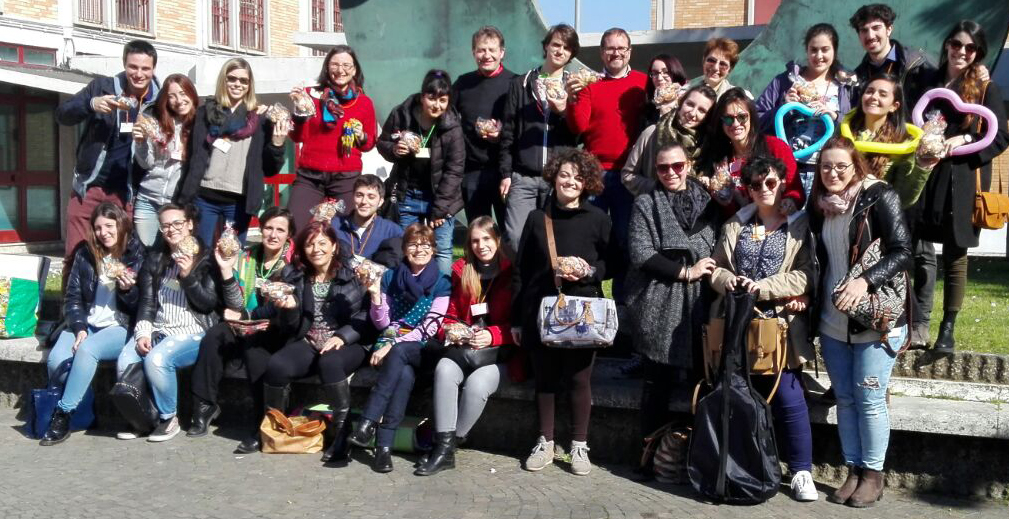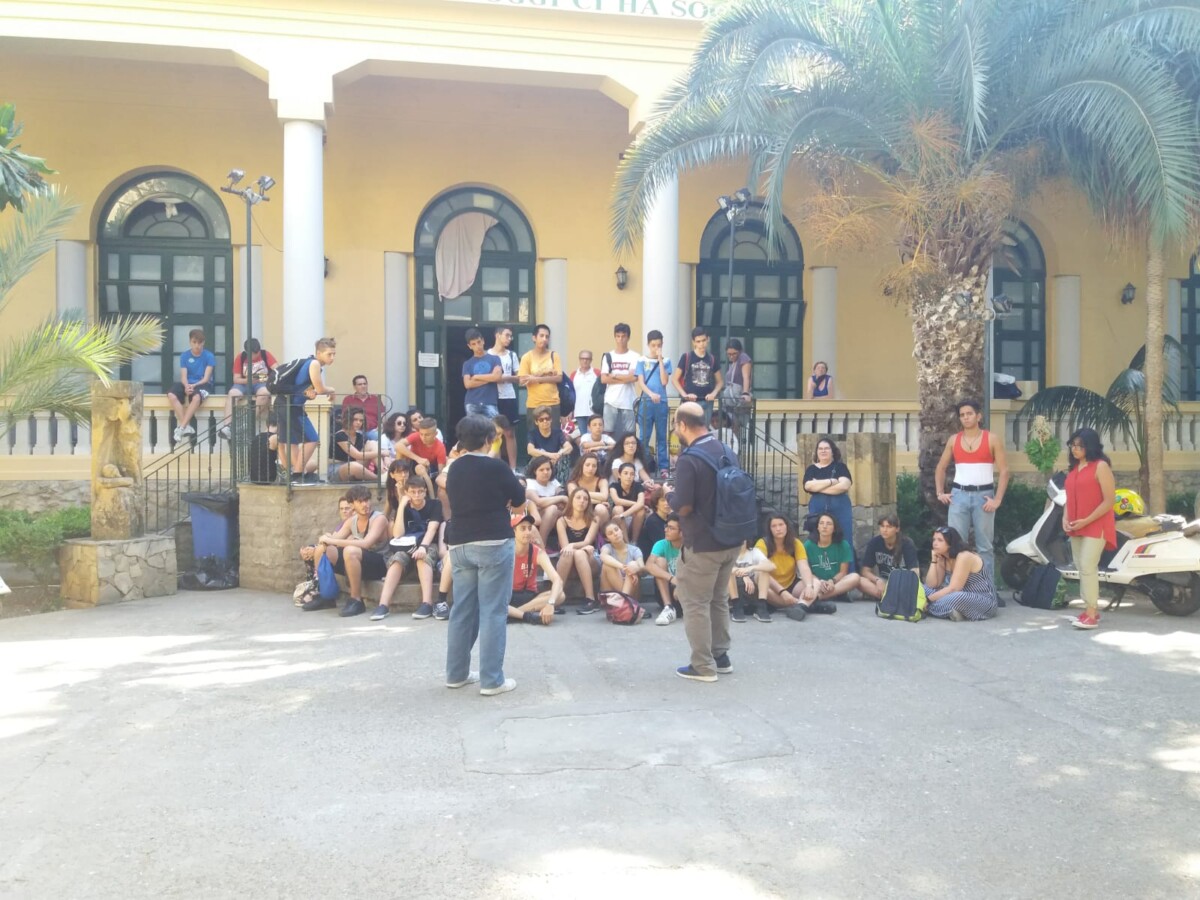
Workshop
Rebibbia, a bridge between inside and outside

According to the Italian Constitution, the purpose of imprisonment is the rehabilitation of the convicted: the prisoner is to be offered opportunities for reintegration into society and, at the same time, paths that allow him or her to become responsible and driven to a socially correct behavior. As a matter of fact, however, this is not always the case.
“In Italy there are few resources and few educators. It would be necessary to create diversified programs, suited to specific cases, and enhance work and training in prison. Otherwise, when they get out, these people have not learned anything,” explains Caterina, twenty-five years old, trainee at the Public Prosecutor’s Office of Rome.
Where the State does not arrive, however, comes the work of many ordinary citizens who decide to spend their energies to show an alternative path to prisoners or simply to “live at their side.” This group of ordinary citizens includes some Youth for a United World from Rome, and Caterina is one of them.
In 2014, driven by the desire to do something concretely for legality, Caterina and her friends came to know that a woman they met, Patrizia, had got in touch with a committee of fathers detained in the prison of Rebibbia (Rome). These fathers were striving to allow children to have something more than a cold meeting with their fathers in the big rooms dedicated to the inmates’ private conversations with people from outside.
“Patrizia knew about our experience of summer camps with the children of the suburbs of Syracuse, Sicily, so she called us and asked us to set up workshops and games with the children to celebrate Christmas,” she reports. Caterina was immediately enthusiastic: in that proposal, she identified her love for justice, but also and above all, her love for people and their stories. On the first date, forty young people showed up.
At the main gate, the prison guard asked them to “leave everything before entering”. He referred to personal items, but Caterina interpreted it as an invitation to leave behind all their prejudices. In the inner courtyard, they set up some stands where one hundred prisoners had the opportunity to meet their wives and play with their children. At the end of the day, it was hard to say whether the happiest people were the children or their fathers.
“The strongest moment was the call for prisoners; one by one they had to separate from their families to return to their cells,” says Caterina. “While thanking us, one of them told me: ‘Hold your freedom tight‘. The educators and the director later wrote to us, moved, saying that no group from outside had ever managed to get in tune with the prisoners and their families as we did.”
This meeting, for Caterina and her friends, was the first step towards building a true and profound relationship with those prisoners. The experience with their children has been repeated over the years on the occasion of the father’s day and at the beginning of summer. One day, a small group of prisoners made a request to discuss, through dialogue with experts, some issues close to them such as legality, psychological distress, and intercultural dialogue.
As a result, last March, a psychologist who was an expert of the developmental age crossed the threshold of Rebibbia, and gave advice to the fathers about how to live the encounters with their children.
“He explained to them that it is important to express their love to children without ever lying about their condition,” reminds Catherine. Together with another psychologist, then, twenty prisoners have explored the issue of depression, but in a perspective of hope, which can also be lived by those who have a very long sentence ahead of them. We were impressed by what the psychologist, after answering the prisoners’ questions, told the young people. “As a matter of fact, there is nothing very different from the situation of a person who is out of prison. The point is to understand how to deal with it, and for them this is more difficult because they do not have contact with the outside,” he said.
Imagining the experience of an inmate, Italian writer Sandro Bonvissuto defined the wall as “the scariest existing instrument of violence” and he added that it has never evolved, because it was already perfect in its atrocity.
“Every day, during the hour outside in the open air, you can get to touch it with your nose and watch it so close that you cannot see it anymore,” he writes. “The wall is not intended to act on your body (…). It is not an object that harms you, it is an idea that hurts.”
While being firmly convinced about the need for punishment, Caterina and her friends want to break through that wall. They want to build a bridge between inside and outside that allows prisoners not to feel crushed by their isolation, and give them hope for a future where they can have a new place in society.
“Some inmates told us how, by dint of being in a cell, one’s sight is significantly lowered,” says Caterina. “Those who came out to benefit from some prize permits told them that it was hard for them to look far, because they were no longer used to looking at the horizon.”
What a strong contrast between this image and the confession of a prisoner who told us he was happy ever since, in prison, he has been able to invest his talents in something as legal as activities for children. Although he had no children of his own and he worked for free for the benefit of the other inmates, he was happy and satisfied. In his previous life, he said, he had always invested his skills in illegal actions and had profited from it, but now he discovered the value of spending himself for others. He began to glimpse a new perspective.
“With our work, we try to convey to them values and lifestyles that, for the most various reasons, were unknown to them,” says Caterina. This is the re-educational aspect, the step after the punitive function of prison. According to Caterina, this task involves the whole society, and not only those who directly deal with the inmates’ world. “Very often most of us, from the outside, build obstacles: let us think of the employers who refuse to hire former prisoners.”
There is still a long way to go, but these young people from Rome, in their small way, believe in it and continue to play their part. “I often think of those prisoners who, while greeting us one day, told us that they looked forward to go out, because they know that there are people like us out there who do not turn them away because of their past mistakes,” says Caterina. “And then I realize it was worth it, because we are really building a bridge, and I understood that quite often the precious pearls are hidden at the bottom of the abyss.”





